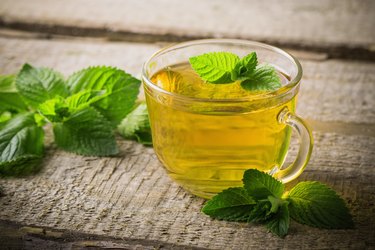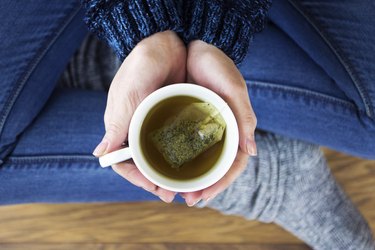
Tea is a great alternative to sugar-sweetened beverages like soda or energy drinks. Hot or cold, it's a smart sipper that boasts plenty of healthy benefits.
Because tea is naturally a very low-calorie drink, it can help you reduce your overall calorie intake when used in place of higher-calorie beverages — which can be an advantage when you're trying to lose weight.
Video of the Day
Video of the Day
Still, drinking tea isn't a guarantee you'll shed pounds: Your overall diet and exercise habits will determine whether or not you'll lose weight drinking tea.
Here, we'll take a look at specific teas touted for weight loss and whether there's any evidence to back up the claims.
1. Jasmine Tea
Jasmine tea has a delicate floral aroma that makes for a delightfully pleasing drink. Made with jasmine-scented green tea leaves — jasmine blossoms are dried and then placed with the dried tea leaves so that their scent is infused — jasmine tea has the same health benefits as green tea.
Jasmine green tea naturally contains caffeine, which has been linked to weight loss. While caffeine alone won't decrease the number on the scale, it appears to slightly increase metabolism (the rate at which your body burns calories) and may temporarily reduce appetite, according to the Mayo Clinic.
Green tea also contains antioxidants called catechins, which have been linked to weight loss.
Indeed, an analysis of 26 randomized controlled trials in the May 2020 issue of Phytotherapy Research concluded that drinking green tea for longer than 12 weeks is linked to lower body weight and BMI in people who have obesity. The researchers noted, though, that green tea should be combined with a balanced, healthy diet and regular exercise to help manage obesity.
The green tea in jasmine tea may also help you decrease body fat and increase lean muscle when combined with resistance training, according to a small double-blinded, placebo-controlled November 2013 study in the Journal of Medicinal Food. The study divided 36 women into four groups, including one that only drank green tea, one that only did resistance training, another that drank green tea and did resistance training and a placebo. All of them also followed an adaptive diet for eight weeks. The group that drank green tea and did resistance training had significant decreases in body fat and waist circumference compared to the group that only did resistance training. They also increased their metabolism, lean muscle and strength.
2. Buckwheat Tea
Buckwheat tea can be made from buckwheat grains or from the leaves of the plant, both of which are rich in antioxidants. The tea has a nutty, earthy taste and a light scent. Drinking it unsweetened keeps the calories down; like other teas, there are virtually no calories in buckwheat tea.
While there's limited evidence linking buckwheat tea to weight loss, its phytonutrient content might offer benefits. Buckwheat tea contains catechins, which are natural antioxidants, per 2002 research in Food Research International. These are the same antioxidants found in green tea that have been associated with weight loss.
An early June 2007 study in Obesity found that green tea extract rich in catechins may help with weight loss and weight control. People who took the supplement experienced weight loss, reduced body fat and narrowing of the waist and hips. The researchers concluded that an extract high in catechins helps with weight loss, but they could not determine if the benefit came solely from the catechins. Plus, it's unclear if the catechins in buckwheat have the same effect as those in the green tea extract.
Buckwheat tea has a dry, nutty flavor that many people enjoy. However, if you prefer to sweeten your tea, be sure to consider the added sugar intake. According to the American Heart Association, a diet high in added sugars — including "natural" sugars such as honey — can lead to weight gain and a greater likelihood of obesity, per the American Heart Association (AHA).
How to Make Buckwheat Tea
You can make buckwheat tea from buckwheat grains, leaves or flowers, or with tea bags; look for them at Asian markets and health food stores. Tartary buckwheat tea can also be made from buckwheat grains purchased at the grocery store.
To make the tea from grains, boil 1 tablespoon of the grains in 1 1/2 cups of water for 30 seconds, then let the tea steep for 10 minutes.
When making the tea from leaves and blossoms, add 1 to 2 tablespoons of dried tea to 1 cup of hot water and let steep for 5 to 10 minutes.
3. Mint Tea

Mint tea, made from peppermint leaves, is a refreshing pick, and as a naturally low-calorie drink, it can help reduce your overall calorie consumption, helping you meet your weight-loss goals. To keep mint tea low in calories, limit the amount of added sugar you use.
Peppermint leaves contain a number of essential oils that have antioxidant properties. An August 2006 review in Phytotherapy Research found that the antioxidants in mint tea had strong antimicrobial and antiviral activities, and peppermint oil may help relieve the symptoms associated with irritable bowel syndrome. A July 2010 study in Pharmacognosy Magazine also found that peppermint oil had antimicrobial and antioxidant effects.
So although it may have some health benefits, there's no research to show that mint tea can help with weight loss.
4. Herbal Teas
Herbal teas, which can be made using a variety of different herbs such as cinnamon, ginger root, chamomile and red raspberry leaf, contain fewer than 3 calories per cup on average, according to the USDA.
A February 2010 study in the Journal for Nurse Practitioners found that herbal teas might support weight loss by decreasing consumption of high-calorie, sugary beverages. In addition, they can help reduce the calorie content of soups when used as soup stock.
Although many herbs used in herbal teas are generally recognized as safe, always chat with your doctor before using herbal tea for weight loss, especially if you're breastfeeding. The safety of some herbs, such as chamomile and ginger, has not been established for breastfeeding women or people with kidney or liver disease. Furthermore, when consumed in high amounts, some herbs may interact with certain medications, per the National Institutes of Health.
5. Black and Green Tea

Both green and black tea contain compounds that may slightly boost weight loss, although neither will help you lose any significant weight on its own.
Black and green tea contain caffeine, which, as we mentioned above, increases metabolism slightly and tamps down appetite temporarily. Black tea tends to have a bit more caffeine, per an April 2010 review in the Journal of Food Science, but more caffeine doesn't necessarily mean more weight loss.
Green tea also contains catechins, as noted above, which some research has associated with better fat- and calorie-burning power. One small study — a randomized clinical trial that included 63 people with type 2 diabetes — found that people who drank 4 cups of green tea a day decreased their body weight, BMI and waist size significantly more than people who drank 2 cups per day or no green tea at all. The results were published December 2013 in the Journal of Research in Medical Sciences.
Black tea contains theaflavins, a group of polyphenols (plant-based micronutrients) with a number of health benefits. Theaflavins have been linked to lower body weight in animal studies, according to a December 2016 paper in Molecules, but there haven't been any large studies done in humans.
In one small randomized, double-blind, placebo-controlled study, 30 people were broken into three groups. Each day for 10 weeks, one group received 50 to 100 mg of theaflavin daily (the amount in about 2 to 4 cups of black tea), another group received 400 mg of catechin (the amount in about 4 cups of green tea) and the third got a placebo. The people who took the theaflavin significantly improved their body fat percentage and muscle percentage compared to the other two groups, per October 2016 results in Bioscience, Biotechnology, and Biochemistry.
While the above study may make it seem like black tea is better than green tea for weight loss, keep in mind that it was very small, and the participants were taking supplements rather than actually drinking tea.
The bottom line: No matter what you drink, the best way to lose weight is to eat a healthy diet and get plenty of exercise. Once you've made these key lifestyle changes, tea may help enhance your results.
The Health Benefits of Tea
Research suggests that tea drinkers are less likely over time to develop diabetes compared with people who drink less tea, per Harvard Health Publishing. Tea contains certain substances linked to better health, specifically polyphenols, which are most prevalent in green teas.
Polyphenols are antioxidants naturally found in plant-based foods (and teas) that help protect the body against free radicals, pathogens and the effects of UV radiation, according to May 2017 research in Nutrients.
Tea may also boost your gut health. The drink contains flavonoids, the largest and most-studied class of polyphenols, which are believed to have prebiotic properties and may alter your gut composition to stimulate the growth of good bacteria, according to a September 2018 article in Nutrients. Similarly, a February 2015 review in the European Journal of Nutrition indicates that several foods rich in polyphenols, including tea, are associated with increasing the good bacteria in the gut.
Black tea and green tea are some of the most potent sources of flavonoids, per a May 2015 study in Current Atherosclerosis Reports.
Related Reading
- Journal for Nurse Practitioners: "Using Herbal Remedies to Maintain Optimal Weight"
- Molecular Medicine Reports: Chamomile: A Herbal Medicine of the Past With Bright Future
- Harvard Health Publishing: "Tea: A cup of good health?"
- Nutrients: "A Critical Review on Polyphenols and Health Benefits of Black Soybeans"
- Nutrients: "Associations between Flavonoid Intakes and Gut Microbiota in a Group of Adults with Cystic Fibrosis"
- European Journal of Nutrition:"Interaction of dietary compounds, especially polyphenols, with the intestinal microbiota: a review"
- Current Atherosclerosis Reports: "Polyphenols, Inflammation, and Cardiovascular Disease"
- Journal of Food Science: "Caffeine (1, 3, 7-trimethylxanthine) in foods: a comprehensive review on consumption, functionality, safety, and regulatory matters"
- Journal of Medicinal Food: "The effects of green tea consumption and resistance training on body composition and resting metabolic rate in overweight or obese women"
- Food Research International: "Buckwheat—the source of antioxidant activity in functional foods"
- American Heart Association: "Added Sugars"
- Phytotherapy Research: "A review of the bioactivity and potential health benefits of peppermint tea (Mentha piperita L.)"
- Pharmacognosy Magazine: "Protective effects of bioactive phytochemicals from Mentha piperita with multiple health potentials"
- National Institutes of Health: "Herb-Drug Interactions"
- Mayo Clinic: "Does caffeine help with weight loss?"
- Phytotherapy Research: "The effect of green tea supplementation on obesity: A systematic review and dose–response meta‐analysis of randomized controlled trials"
- USDA: "Tea, hot, herbal"
- Molecules: "Mechanisms of Body Weight Reduction by Black Tea Polyphenols"
- Bioscience, Biotechnology, and Biochemistry: "Effect of oral theaflavin administration on body weight, fat, and muscle in healthy subjects: a randomized pilot study"
- Journal of Research in Medical Sciences: "The effects of green tea consumption on metabolic and anthropometric indices in patients with Type 2 diabetes"